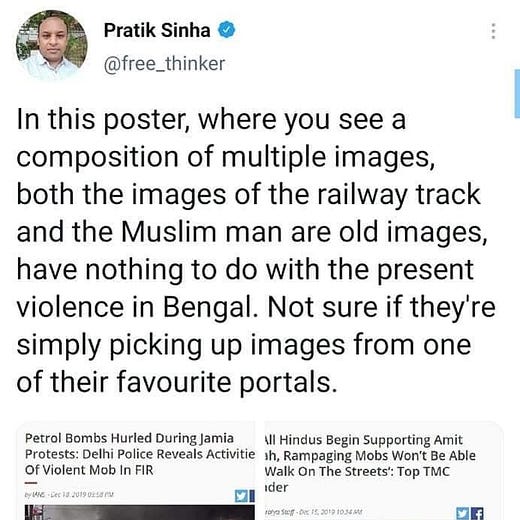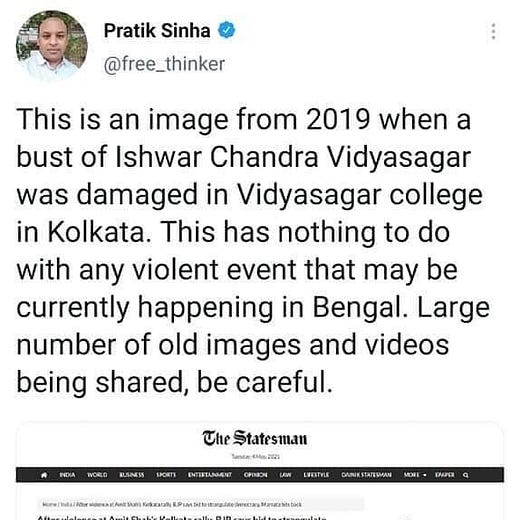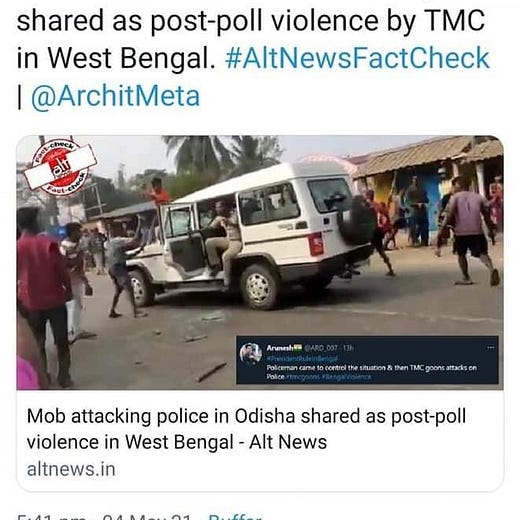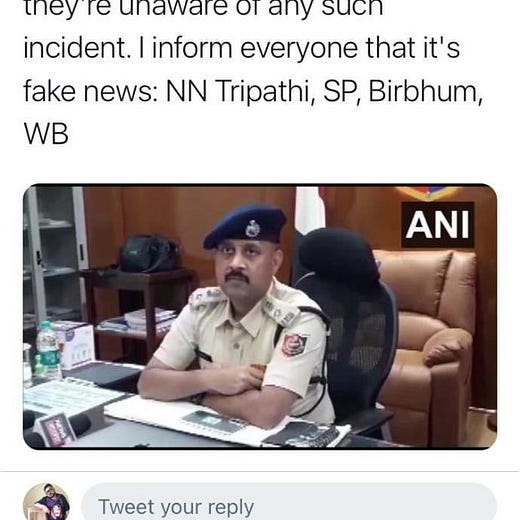The India Cable: Hospital Deaths ‘Genocide’: High Court; Virus Destroys BCCI’s Immunity
Plus: Beds, ventilators dwindled during pandemic, no transparency on foreign aid, Bengal violence spun as communal, Yogi applies oximeters to cows and Yo-Yo Ma has a song for India
From the founding editors of The Wire—MK Venu, Siddharth Varadarajan and Sidharth Bhatia—and journalists-writers Seema Chishti, Sushant Singh and Tanweer Alam. Editor: Pratik Kanjilal
Snapshot of the day
May 5, 2021
Pratik Kanjilal
The cities of Uttar Pradesh are reeling under a shortage of oxygen and beds, and a silent disaster could be underway in the villages, far from medical help and media coverage. The Adityanath government has responded smartly by issuing instructions to set up cow protection helpdesks in every district. The state’s 10,000-odd cow shelters have been instructed to follow Covid-19 protocols and use oximeters and thermal scanners on cows.
In the first confirmed case of animal infection in India, eight Asiatic lions housed in the Nehru Zoological Park in Hyderabad were found to have contracted Covid-19. The lions were showing respiratory distress, following which their nasal and oral discharge samples were collected under anesthesia on April 24. RT-PCR tests at the Laboratory for Conservation of Endangered Species at CSIR-Centre for Cellular and Molecular Biology (LaCONES-CCMB) in Hyderabad confirmed that they were positive for coronavirus.
A survey by LocalCircles finds that 61 per cent of Indians are “feeling angry, upset, depressed or worried as the Covid-19 second wave wreaks havoc in the country.” People suspect that experts do not have a grip on the situation, and they have begun to worry about livelihoods.
India reports 3,82,315 new infections and 3,780 deaths in the last 24 hours. “India deaths in record rise”, commented The Guardian today. Meanwhile, around 300 top officials of the Modi government wasted one and a half hours watching a presentation to try and spin the news, to “create a positive image of the government” and manage “perception”, making the government “be seen to be sensitive, bold, quick, responsive, hardworking etc”.
Elections are over, so the price of petrol was raised by 15 paise and diesel by 18 paise, for the second day in a row. India’s fuel prices are already among the highest in the region, and are mostly taxes.
Several top international cricketers are scrambling to return home after the Twenty20 tournament was suspended indefinitely. Australia has criminalised returns from India, so starting today, its nationals marooned here may have to cool off for a while in the Maldives. Badminton rockstar Prakash Padukone has Covid-19 and is reported to be recovering. The memory of the press is short, so he is being referred to as “Deepika Padukone’s father”.
Healthy individuals may not need an RT-PCR test for domestic travel any more. This is to reduce the load on laboratories, An Indian Council of Medical Research advisory states that the RT-PCR test must not be repeated in any individual who has tested positive once, either by RAT or RT-PCR, and that testing is not required for Covid-19 recovered individuals at the time of hospital discharge.
Dr Rakesh Mishra of INSACOG, a government consortium of gene sequencing laboratories, has said, “We warned the government in early March of an exponential rise in cases and deaths. It’s hard to believe that the PM was not told.” (from 05:32)
The National Human Rights Commission has ordered a “spot inquiry” following reports of post-poll violence from several districts in West Bengal. They’ll have to sift through a mass of charges and counter-charges being made on TV and the internet. Fake footage is being outed, and a fake news campaign to trigger unrest and justify President’s Rule is spoken of. People in the state have seen that the BJP stripped the AAP government of Delhi of its powers ― and by implication, the people of their vote ― when the party understood that it would not be able to take the city. Now that the BJP has been baffled by a woman in flip-flops, West Bengal anticipates desperate measures in Kolkata, too.
While they’re about it, the NHRC may also consider launching a spot probe into the Covid numbers in Uttar Pradesh, which have begun to veer so far from reality that people could die laughing.
Assam needs to seriously worry about ‘infiltration’ ― from West Bengal, all over again. As the BJP tries to spin the political violence and exaggerate it as a communal faultline, Hemanta Biswa Sarma has said, “300-400 BJP karyakartas and family members have crossed over to Dhubri in Assam fearing persecution and violence.”
Global media just cannot get its head around the vaccine botch-up in India. Al Jazeera asks, “Did India get its Covid vaccine strategy wrong?” India exported millions of Covid-19 vaccines, then witnessed record numbers of cases and deaths. There is no room to bury the dead in Maharashtra. While corpses pile up at crematoria, Muslims and Christians struggle to accommodate a deluge of new arrivals at burial grounds.
The Centre for Cellular and Molecular Biology has discovered the N440K variant which could be behind the havoc in Visakhapatnam and other parts of Andhra Pradesh. First discovered in Kurnool, it is considered to be at least 15 times more virulent than earlier varieties, and may be more dangerous than the Indian variants B1.617 and B1.618, The Hindu reported yesterday.
With over 140 super-rich persons, India is home to the world’s third-biggest number of billionaires. Most of the ultra-rich have not stepped up to help out those in distress – not publicly, at least. The few who have contributed have done so through their companies’ corporate social responsibility budgets (which are mandated by company law) and not their own pockets.
India and the UK have signed a landmark migration and mobility deal under which, among other things, Indian illegal immigrants will be repatriated to make room for professionals from India, and also allow UK lawyers to work in India. The fly in the ointment is that some in the Indian delegation could be infected.
Prime Minister Modi wants NGOs to help fight Covid-19, but their hands are tied by rules his government introduced in the midst of the pandemic. These have destroyed their system of sourcing and applying funds and disincentivised them from developing institutions like hospitals. The irrational suspicion that all NGOs are either crooked or fronts for foreign interests has deprived the government of a useful ally.
One of the two Election Commissioners in office had strongly advised against calling on the Supreme Court to gag the media. The said commissioner need not worry. He will no doubt be gagged soon, like his predecessor Ashok Lavasa was. A third commissioner is to be appointed shortly.
The Supreme Court has struck down the Maratha quota in Maharashtra. And in the state Modi once described as Somalia, the grassroots healthcare system works, offering a pleasant contrast to the desperation seen in under-provided hospitals in Modi’s Delhi.
Foreign aid delayed as agencies, departments fumble
Public outrage has had its effect after an investigation by Scroll showed that foreign aid material flown into Delhi airport had not moved till Monday evening. Yesterday, India Today reported that the Centre had taken seven days to notify the procedure to distribute these supplies to states, appointing HLL Lifecare as the distribution manager as late as May 2. While the Health Ministry issued a rejoinder claiming that the story was “misleading”, the rebuttal confirmed that the “Standard Operating Procedure for allocations was issued by the Health Ministry on 2nd May, 2021”. Hindustan Times has the full list of items received as medical aid between April 24 and May 2. One way the government can clear the air is to publish the list of what items were sent where and when. But it has not done so yet.
The Central government also issued a statement that the material had been dispatched to 31 states and Union territories, and was distributed to 38 central government institutions and hospitals. However, interviews with state officials by Scroll revealed that the distribution process began on Monday evening, May 3, more than a week after the first batch of assistance arrived in India. Some of these items had also started moving to states like Punjab but questions remain in India and the US about utilisation. “Ministries fumble” and there is no clarity as to which agency, website or official to approach to get data on the distribution of the foreign aid.
Centre and UP government court trouble
The oxygen crisis continues to plague the capital. The Delhi High Court yesterday directed the Central government to show cause as to why contempt proceedings should not be initiated for non-compliance with orders passed on the supply of oxygen to the national capital. “Enough is enough. We are not going to take no for an answer. There is no way that you won’t supply 700 MT right away,” the court said.
On Tuesday, the Karnataka High Court took strong exception to the Central government’s lack of commitment to increasing the supply of oxygen to the state, in spite of the rising number of Covid-19 cases and deaths there. “You want people to die? Tell us when you are going to increase oxygen quota?” it demanded to know.
The UP government was in the line of fire as the Allahabad High Court had plenty to say. The Covid deaths due to lack of oxygen in hospitals constitute “a genocide by those who have been entrusted with the task to ensure continuous procurement and supply chain of liquid medical oxygen,” said the court as it blew the lid off Chief Minister Adityanath’s efforts to keep the dystopian state of affairs under wraps. The court said it found that the news conveyed a picture contrary to the government’s claim that there is sufficient supply of oxygen.
ICU beds, ventilators dwindled during pandemic
An IndiaToday analysis of government data reveals that the number of oxygen-supported and ICU beds and ventilators saw a drastic decrease between September last year (the peak of the first Covid-19 wave in India) and January-end this year (just before the second wave started, around mid-February).
Between September 22 last year and January 28 this year, the total number of oxygen-supported and ICU beds fell by 38%. Covid ICU beds saw a decrease of 46%, falling from 66,638 on September 22 to just 36,008 on January 28. India had 33,024 ventilators on September 22. By January 28, the number fell to 23,618 ― a decline of 28%.
Without state help, pandemic is internal matter for embassies
The inability of the Modi government to deal with the pandemic is becoming a full-blown image crisis for the optics-obsessed regime. It’s not just New Zealand and the Philippines which are in bad odour in the capital, for appealing to the Youth Congress for oxygen cylinders. A Tanzanian diplomat has died and several embassies and missions — of the US, Germany, Israel, Bangladesh, Afghanistan, Sweden, Nepal — have active Covid cases. The US Embassy is reportedly facing an outbreak, with over 100 active cases. Two of its local staffers have died in the last month.
The Long Cable
Covid finally destroys BCCI’s immunity
Sidharth Bhatia
So it was a tiny virus that finally felled the massive, cash generating machine known as the Indian Premier League, the annual cricket tournament. Growing public opinion that the IPL should be cancelled during the Covid pandemic was simply ignored by the pooh-bahs of the BCCI, who were too focused on the profits, but when players and ground staff from at least four teams tested positive, the bubble the IPL operated in finally burst.
The BCCI statement about the ‘postponement’ – not cancellation – of the rest of the matches focused on the safety of the players and the others, rather than what is happening in the rest of India, which is coping with not just the disease but also its brutal aftermath – lack of hospital beds, a severe shortage of vital oxygen cylinders and the loss of near and dear ones.
The BCCI has been completely uncaring about the pandemic and the misery it had wrought, and that is not surprising. The sensible and sensitive thing to do would have been to cancel this mix of glitz and sleaze, with its cheerleaders, the auction of cricketers and general mockery of the game. But for the organisers, that just didn’t matter.
That the cancellation alone will cost an estimated loss of almost Rs 2,000 crores gives a rough idea of the eventual revenue that was involved. Even without live crowds – except for the first match at the Narendra Modi stadium in Ahmedabad – the takings from sponsorships and TV rights add up to a tidy sum. In 2017, Star picked up the broadcasting rights for five years for a tidy Rs 16,348 crore (over $2 billion) and everyone from the franchise owners to the advertisers on television to the BCCI itself, which runs IPL, were walking away with a lot of money.
But the BCCI could also afford to be oblivious to pressure, given its connections. The president of the board is Jay Shah, son of Home Minister Amit Shah, which makes him a very powerful person indeed. Though he is not a politician, the BCCI has for long been in the grip of politicians, directly or indirectly. Sharad Pawar was president until recently and former Union minister Arun Jaitley controlled the Delhi Cricket Association. The Gujarat Cricket Association was headed by Prime Minister Narendra Modi and his deputy there was Amit Shah, who then took over the GCA in 2014. In keeping with the tone set by the current dispensation, which is often unmoved by public opinion, the BCCI too simply turned its back to the suggestion of cancellation.
A brash attitude is part of the IPL’s DNA. The second tournament, in 2009, was almost overnight moved to South Africa after the government refused to spare paramilitary forces for security because the series was coinciding with the general elections. In 2020, as the first wave of the pandemic hit and a hard national lockdown was imposed, the games moved to the UAE. The BCCI and its supporters claim that many people’s incomes are involved, but in these two instances, the big boys – broadcast companies, team owners, advertisers – weren’t affected, so this pious claim doesn’t wash.
Clearly, had it not been for the second wave, the contest would have continued. Television viewership was falling, which clearly suggests people had other things on their mind, but even that was lost on the organisers. Now, it’s back to the drawing board to calculate losses and to curse the dreaded virus that cut through the immunity of the mighty BCCI.
Reportedly
The permanent expulsion of actor Kangana Ranaut from Twitter, which punches above its weight in politics, has set tongues wagging. Ranaut has earlier been rewarded for her bizarre, obnoxious defence of the actions of the BJP and the Hindutva ecosphere, and was given Y-category security during the Sushant Singh Rajput affair. So, what did she say wrong?
By giving a call for mass violence (gundai) in West Bengal, and urging Modi to display his aggression from “early 2000s”, she was drawing a straight line connecting him with the anti-Muslim pogrom in Gujarat in 2002. This could be fatal for the PM, who moved smartly to distance himself from the pogrom and its legal consequences. Now, when the BJP is trying to play victim in West Bengal and maybe even moving to make a case for President’s rule there, after losing the election, Ranaut’s honesty could become a self-goal for the Right. It’s impossible to coach her, and perhaps the Hindutva narrative-builders thought it best to just offload her from Twitter.
Fleeing the pandemic
As many as 86 persons from India, travelling in 11 boats, were yesterday caught in Sri Lankan waters as they tried to enter the island nation, possibly fleeing the raging pandemic, the Sri Lankan Navy said. The Sri Lankan Navy says they are illegal immigrants – ‘infiltrators’ in the Indian government’s parlance – while the Indian mission says they are fishermen.
Prime Number: Rs 100That is the amount which will be paid every day to fourth and fifth year MBBS students, contractual doctors and junior/senior residents working at Covid hospitals in Himachal Pradesh, till June this year. The daily minimum wage for highly skilled workers in the state is Rs 330.Deep Dive
Don’t pick it up! The portal restofworld.in recalls the age of expensive telecom, when the missed call was the message. But in India, technology moved faster than one could imagine.
Huawei missing from 5G trials
India will allow mobile carriers to carry out 5G trials over six months with equipment makers including Ericsson, Nokia and Samsung’s network unit, the government said yesterday, but did not name China’s Huawei and ZTE among the participants. However, it has not banned them from supplying 5G equipment to carriers.
Adani may abandon Myanmar project
Billionaire Gautam Adani’s port-to-energy conglomerate has said that its US-based counsels are of the opinion that its investment in a port in Myanmar are not in violation of law, but the firm will abandon the project if the US administration opines that the investment was in violation of sanctions against the military-ruled nation.
Op-Eds you don’t want to miss
The leader in New Scientist is titled: “India’s crisis should be a warning against Covid-19 complacency.” You bet.
Nature magazine’s editorial is on India, Brazil and the human cost of sidelining science.
How the ‘vishwaguru’ collapsed in 60 days. Rakesh Sood asks how we could sleepwalk into a disaster of such magnitude, the worst India has faced since Partition in 1947.
Looking at India from afar, I’m furious at Modi’s wilful neglect of my homeland, writes Natalie Grover in The Guardian.
The scale of the tragedy is so large that no bid to camouflage it will succeed, writes Shyam Saran.
This is the right time for the Central government to place bulk orders for vaccines in advance instead of ordering just for the next three months, writes Vivek Kaul.
Today, private entities and citizens have no option but to seek legal recourse for essential amenities in a pandemic. The judiciary is being forced by citizens to step into a vacuum created by the executive, and thereby fulfil its constitutional duty to do justice, writes Abhik Chimni.
“Free shots for all” must be India’s vaccination strategy, asserts Jean Dreze.
In healthcare, Gujarat is in the BIMARU league, write Christophe Jaffrelot and Sharik Laliwala. Less than Rs 5 is allocated for daily healthcare expenditure per person in its budget.
RK Pattanaik writes on the “blind optimism on GDP growth” by the government and multilateral institutions.
What we need to do to ensure India’s Covid vaccine shortage doesn’t get worse ― Neeta Sanghi lays out the roadmap.
Whatever the cause or contours of the post-election violence in West Bengal, says Apoorvanand, Mamata Banerjee cannot evade her responsibility to end it immediately,
Why the Maratha quota case in Supreme Court is about more than just the 50% limit to reservations. It is about the federal question of whether states have the right to identify backward classes, writes Sruthisagar Yamunan.
Listen Up
“Chaitanya believes in pure cinema. He’s a rare breed.” Alfonso Cuarón and Chaitanya Tamhane speak to Anupama Chopra about their creative collaboration on the much-discussed film, The Disciple.
Watch Out
The young Mohandas Karamchand Gandhi ― ‘Restless as Mercury’. Sunil Khilnani and Gopalkrishna Gandhi discuss.
https://bangaloreinternationalcentre.org/video/restless-as-mercury/
Over and Out
V Kalyanam, 99, private secretary of Mahatma Gandhi and the lone surviving witness to his assassination by Nathuram Godse, has died. Here, he recounts Gandhi’s murder.
Naser Husain, the Chennai-born former English cricket captain, said of the doomed IPL: “Unedifying watching this tournament when people are dying just up the road.”
And solo cellist Yo-Yo Ma has a song of comfort for India.
That’s it for today. We’ll be back with you tomorrow, on a device near you. If The India Cable was forwarded to you by a friend (perhaps a common friend!) book your own copy by SUBSCRIBING HERE.






